Federal Budget 2024: Every Aussie household to get $300 rebate
The government has announced huge news for every household in Australia as part of its focus on easing cost of living pressures.
Fed Budget
Don't miss out on the headlines from Fed Budget. Followed categories will be added to My News.
Treasurer Jim Chalmers handed down his third budget on Tuesday night, with a back-to-back surplus of $9.3 billion for the first time in almost two decades.
He has promised to unveil nationwide cost of living measures in Tuesday’s budget but has insisted it will not fuel inflation or further interest rate rises.
The budget surplus is the first since the global financial crisis hit but won’t last long as the surplus will disappear from 2024-25.
The federal government’s finances will plunge into the red over the next four years due to “unavoidable spending” on the likes of defence, the National Disability Insurance Scheme, interest payments on debt, aged care and health.
But back to this year’s budget – here is what is happening and what’s to come.
‘A real risk’: Budget interest rate warning
Professor of Economics Steven Hamilton says his eyes “popped out of his head” when he saw the budget papers, particularly at the government’s decision to allocate $10 billion to new spending.
“If you have unavoidable spending, you need to make room for it,” he said.
“The Government has delivered a budget and the goal of it is to give an envelope and allocate it to the things you prioritise. I don’t see that.
“We have a $28 billion deficit in the coming financial year and $20 billion of that comes from new decisions in the last two budgets. Make of that what you will.”
He said that adding so much stimulus into the economy via tax cuts and refunds “is a real risk” and would eventually drive up interest rates.
“The rule of thumb a lot of people use is that every roughly $7 billion in defecit generates a quarter point increase in interest rates.
“That’s 2 per cent or 3 per cent interest rate increases. And you look at the stage 3 tax cuts, that’s $44 billion of stimulus to the economy. “That’s a 1.5 per cent interest rate increase.
“Look, in a time like this when the Reserve Bank is right on the edge, where they’re right on the edge of raising rates, to be pushing this much stimulus into the economy, I think that’s a real risk.”
‘Inflationary’: Angus Taylor delivers Coalition’s first budget response
Shadow treasurer Angus Taylor has called the budget “inflationary” in the Coalition’s first response.
“When you plan to spend money it is inflationary,” he said.
“We have a 16 per cent increase in spending over two years and the economy is only going out close to 7 per cent, so that is spending growing at double the pace of the economy, and that takes you to a $43 billion structural deficit in two years’ time.
“That is inflation. When you have $4 of spending for every dollar of savings, you are not fighting the inflation dragon – that homegrown inflation – that so many Australians are suffering with.”
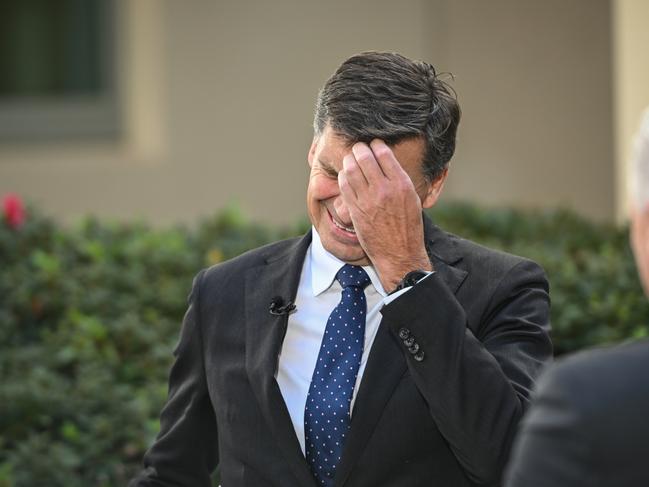
$300 energy rebate confirmed
Dr Chalmers has confirmed a rebate of $300 for every Aussie household from July 1.
“Electricity prices would have risen 15 per cent in the last year, if not for our efforts. Instead, they rose an average of 2 per cent,” he said.
“And tonight, I assure Australians that more help is on the way. This budget delivers $3.5 billion in new energy bill relief for everyone. Just as every Australian taxpayer will get a tax cut, every Australian household will get energy price relief.”
One million small businesses will get a “little bit more” than the $300 rebate given to households, the Treasurer said.
“The ABS has shown how cutting energy bills directly cuts inflation too, keeping the lights on for families and businesses, and keeping downward pressure on inflation,” he said.
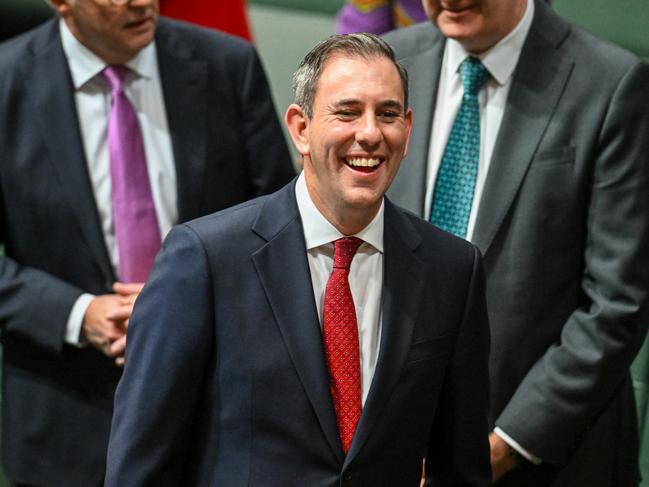
‘You haven’t’: Chalmers asked brutal job question
ABC’s Sarah Ferguson has asked Jim Chalmers if the Labor government cares more about people with jobs than those who are unemployed.
She asked the question during his post-budget interview on 7.30, noting that, with unemployment forecast to rise, there have been calls to raise the Jobseeker payment.
“You haven’t. Do your budget priorities suggest that you care more about those who have jobs than those who don’t?” she asked.
Dr Chalmers refuted the claim, saying Jobseeker has been increased by $40 a fortnight and is now $120 higher a fortnight than when they first came into office.
“There’s more than one way to help people who are especially vulnerable, including the jobless, energy rebates, rent assistance in and other ways too,” he added.
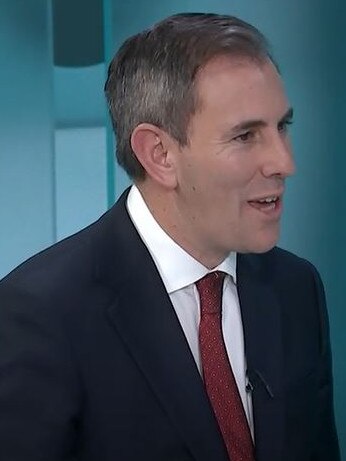
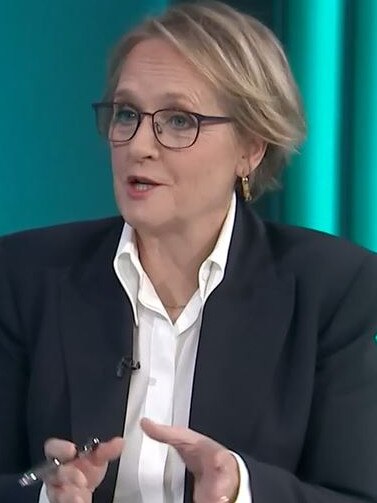
Popular family car slugged with new tax
A $13-million-a-year regulator will be established to police the Albanese government’s new vehicle carbon emissions regulations, dubbed a “ute tax” by some critics, when the scheme starts next year.
Labor’s controversial New Vehicle Efficiency Standard (NVES), which the industry had warned could drive up the cost of the country’s most popular cars like the Ford Ranger by more than $10,000, will kick in on January 1, 2025.
Tuesday’s budget reveals the Albanese government will spend nearly $155 million over the next six years to get the NVES up and running “to support greater choice of fuel-efficient vehicles that will reduce motoring costs and transport emissions”.
“The New Vehicle Efficiency Standard will save Australians around $95 billion at the bowser by 2050 and reduce transport emissions,” budget papers state.
The NVES aims to reduce emissions from new passenger vehicles by more than 60 per cent by 2030, and roughly halve the emissions of new light commercial vehicles over the same period.
- Frank Chung
Chalmers grilled on $300 rebate for rich Aussies
Jim Chalmers has been grilled on why wealthy Australians will be getting a $300 rebate on their energy bills when it is low-to-middle income earners that need the most help.
In his first post-budget interview on ABC’s 7.30, Sarah Ferguson questioned the decision to include high income earners in the $300 power bill subsidy announced in the federal budget.
Dr Chalmers claimed there were “broad parts” of Labor’s cost of living package, like the tax cuts for every taxpayer and energy bill relief for every household, and more “targeted” parts, like rent assistance and help with medicine costs.
“We found a responsible and affordable but meaningful way to help people with the cost of living, not just people on low and fixed incomes but people in middle Australia too,” he said.
But Ferguson pressed the issue, saying: “There’s a whole bunch of people who aren’t in middle Australia like yourself who don’t need help paying their bills. Why do you need to give energy relief to those people?”
Dr Chalmers said that the cost of living pressures go up and down the income scale, but fall most on the people on the lowest incomes and fixed incomes as they are “obviously the priority”.
“But I think people are under the pump right around Australia,” he said.
Ferguson responded that the Treasurer should acknowledge that there are people, like Baby Boomers and people who won the “housing lottery”, that are not under the pump.
“Why will they get $300 in their pocket?” she asked, to which Dr Chalmers said the cost of living pressures apply “broadly” in the community.
Ferguson claimed that she had not received an answer on why wealthy Australians are getting the $300 rebate
“I think you have,” Dr Chalmers replied.
“I’m going to disagree with you because I’m asking why it is you’re choosing to give wealthy people $300?” Ferguson said.
“It’s the easiest, simplest, most efficient way to provide the help,” he responded.
Winners and losers in the budget
From energy rebates, to tax cuts, “responsible” cost-of-living relief that doesn’t aggravate inflation has formed the centrepiece of federal Treasurer Jim Chalmers’ third budget.
Handing down the 2024-25 budget on Tuesday night, he described it as a budget for the “here-and-now” amid “fraught and fragile global conditions,” like lingering inflation and higher interest rates.
Delivering a surplus of $9.3bn on Tuesday night, Dr Chalmers promised the government’s relief measures would not increase inflation, and claimed Australia was among the “best placed economies to manage these uncertainties and maximise our opportunities”.
For Australian families, the key cost-of-living relief includes a surprise $300 energy rebate for all families, and the government’s promised revised Stage 3 tax cuts.
However this year’s budget contained little for welfare recipients calling for increased payments, or motorists facing growing fuel prices.
Find a detailed list of the winners and losers of this year’s federal budget here.
– NCA NewsWire
All the changes being made to HECS
Mr Chalmers said spikes in inflation have “exposed a flaw” in Australia’s student loan system, which has put young people under “unfair pressure”.
“We are fixing that, and we are changing that so that it won’t happen again,” he said.
The changes include:
– A cap on the indexation of HECS loans to either the Consumer Price Index or the Wage Price Index, whichever is lower. This will be backdated to the middle of 2023.
– Indexation from 2023 will be cut in half, wiping $3 billion in student debt for over 3 million Australians and saving the average person around $1200.
Medicare to be made ‘stronger’
The Treasurer has detailed Labor’s plan to make Medicare “stronger” and medicines “cheaper”.
The changes will include:
– $3 billion for cheaper medicines and the community pharmacies that distribute them.
– A freeze on the maximum cost of PBS prescriptions for everyone.
– $3.4 billion to add “life-changing and life-saving” medicines to the PBS, cutting the cost of one breast cancer treatment from around $100,000 to $31.60.
First back-to-back rent help increase in more than 30 years
There will be a $1.9 billion increase to the maximum rates of the Commonwealth Rent Assistance, with rates to rise by 10 per cent.
This comes on top of the 15 per cent increase delivered in last year’s budget.
“It’s the first back-to-back increase to Commonwealth Rent Assistance in more than 30 years,” the Treasurer said.
“And more much-needed help for young people and for renters of all ages doing it tough. So we’re easing the cost of living and we are building more homes for Australians.”
In the five years from July 2024, the government will aim to build 1.2 million homes.
“Our goal is ambitious, but it’s achieve able if we all work together and if we all do our bit,” Dr Chalmers said.
“$6.2 billion in new investments mean our $32 billion Homes for Australia Plan will clear local infrastructure bottlenecks, provide more housing for students, fund more social and affordable housing.
“And we will also deliver better transport for better access to suburbs and cities and regions.”
Aussies leaving NSW in droves
Aussies are leaving NSW in droves as Sydney’s status as the country’s most expensive city drives its residents into the waiting arms of the other states.
Every day, on average, 77 people are ditching NSW overwhelmingly to set up shop in Queensland and Western Australia.
That’s according to new state population projections from the federal government revealed in Tuesday’s budget.
By the end of this financial year, 28,200 more people will have left NSW than arrived.
A greater number — 28,500 — will relocate to Queensland. A further 7000 will make Western Australia their new home.
A smaller amount of 1500 net interstate migrants will land in Victoria this year while a handful of people, at less than 3000 each, will leave the Northern Territory, the ACT, South Australia and Tasmania.
And the trend isn’t going away any time soon, with projections for the next financial year finding that a further 23,000 people will leave NSW while the same number of people will make Queensland their new home.
– Alex Turner-Cohen
Future Made in Australia package to make us ‘indispensable’
Dr Chalmers said the $22.7 billion Future Made in Australia package will make the country an “indispensable part of the global net zero economy.
He said the package is all about attracting investment in key industries, making Australia a “renewable energy superpower” and strengthening our defence capabilities and our economic security.
There will also be support for small businesses to be able to “grasp the opportunities of our transforming economy”, as well as expanding and reforming tertiary education for a more skilled workforce.
“To realise the opportunities of a future made in Australia, we’re changing the way that we are tracked and deploy investment in our economy,” Dr Chalmers said.
“A new app will focus the investment on transformational opportunities, and set conditions to ensure investors benefiting from our incentives are supporting their people and communities to lift private investments in skills and workers and workforces and local supply chains.”
‘A budget for decades to come’
Treasurer Jim Chalmers has started his budget speech, branding it a “budget for the here and now and a budget for decades to come”.
“It’s a responsible budget that helps people under pressure today and invests in the promise and potential of the more prosperous future that we can make together.
“Our main priorities are helping with the cost of living, building more homes for Australians, investing in a Future Made in Australia, and the skills and universities we’ll need to make it a reality.”
Other focus areas include strengthening Medicare, delivering more TAFE and university opportunities and energy and industry policies that will “help bring the jobs of the future to every corner of our country”.
Budget speech just minutes away
The countdown is now on, with Treasurer Jim Chalmers to deliver his speech for the 24-2025 Federal Budget at 7.30pm AEST.
The speech will be broadcast live from Parliament House in Canberra.
For people in NSW, ACT, Queensland, Tasmania and Victoria, the speech will start at 7.30pm AEST.
It will be on at 7pm ACST for those in the Northern Territory and South Australia and 5.30pm AWST for those in Western Australia.
Energy bill relief for every household
Every household in Australia is reportedly set to get an energy bill rebate as part of the 2024-2025 Federal Budget.
The changes come amid an increased focus on cost of living pressures being experienced by Aussies across the country.
One million small businesses will also be able to claim the rebate.
The exact figures for the relief package are yet to be announced, but last year’s budget included up to $500 off for eligible families, with that increasing to $650 for small businesses.
However, the $500 rebate was only available to concession card holders, pensioners and veterans.
This comes amid hints from the Labor government that energy bill relief would be a continuing feature of this year’s budget.
“Our government understands that for small business – as for Australian families – energy bills remain a source of financial pressure,” Prime Minister Anthony Albanese said last month.
Mr Albanese said that small businesses and families would be “front and centre in our thinking” when finalising this year’s announcement.
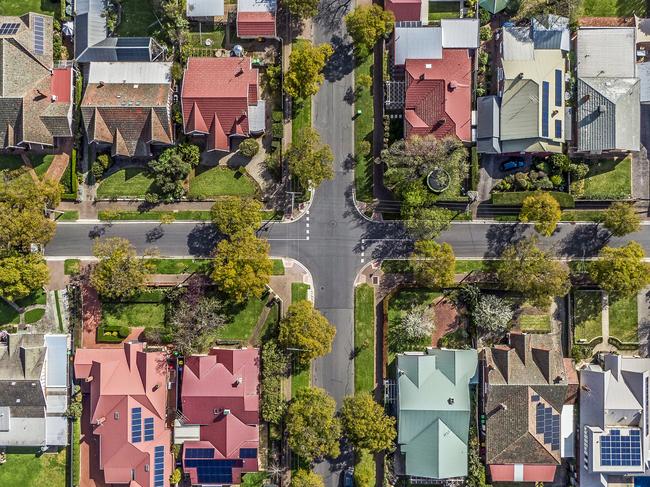
Rent assistance increase
The budget will include an increase to Commonwealth Rent Assistance, though it is not yet clear how much the payment will jump.
Currently, eligible recipients can receive a maximum fortnightly payment of $250.
The increase follows a recommendation from the Economic Inclusion Advisory Committee to increase the payment to ensure it is in light with rental increases.
Last week, Dr Chalmers said there would be “additional steps in the budget” to include some of the recommendations from the Economic Inclusion Advisory Committee.
The committee is also pushing for a substantial increase in Jobseeker.
Asking rents have risen by more than 75 per cent since the start of the pandemic, according to SQM Research, meaning even Australians with good incomes are under mounting pressure
The InfoChoice Rent Crisis Survey, released in January, found 70 per cent of respondents who lease their home are in a state of housing stress.
Budget wins we know so far
Aussies are begging for cost of living relief as they have been smashed by skyrocketing interest rates, soaring grocery costs, higher fuel prices and runaway rental increases.
Here is what we know so far about the budget.
We already know a big part of the government’s cost of living relief is the overhauled Stage 3 tax cuts. Set to take effect from July 1, these tax cuts will bolster the take-home pay of every taxpayer – rather than middle and high income earners who benefited under Morrison-era iteration of the tax package.
Every household, plus one million small businesses, will get power bill relief, though we won’t know exactly how much Aussies are getting back until the Treasurer speaks at 7.30pm.
There will also be a boost to Commonwealth Rent Assistance, with the current maximum fortnightly payment sitting at $250.
University graduates have welcomed the news that $3 billion in HECS-HELP student debt would be wiped for three million Aussies.
There will be a $11.3 billion package aimed at boosting the supply of social and affordable homes. The government will also spend an additional $90 million to boost the number of skilled workers in the construction and housing sector.
The biggest budget centrepiece so far is trying to reshape the economy with its Future Made in Australia industry package, which will include tax concessions, direct subsidies and grants, aimed at strengthening the economy as it transitions to a clean-energy future.
It includes $3.4 billion in unspecified loans, grants and equity stakes towards the manufacture of solar panels in Australia, the luring to Brisbane of Silicon Valley start-up PsiQuantum to support their bid to build the world’s first usable quantum supercomputer., and seed money for three critical minerals projects.
It has also flagged a multibillion-dollar commitment to increase aged care and child care wages, over $3 billion in new defence spending and $8.5 billion in new health investment.
The Albanese Government has also announced a $49.1 million investment into tackling endometriosis, pledged almost $1 billion to combat violence against women and will begin paying superannuation on taxpayer-funded paid parental leave from July 1, 2025.
There was also an announcement to spend $161.3 million on creating a national firearms register.
‘It’s grim’: Tax cuts don’t go far enough for young Aussies
The government has been warned it needs to do more for young Australians if it wants their support in next year’s Federal Election.
During ABC’s pre-budget Q&A panel on Monday night, Kos Samaras, director of research firm RedBridge Australia, said Australians were “dying for hope”.
He told the panel that unless “something drastic” comes from tonight’s budget, an additional one million Aussies will likely turn their backs on the major parties.
“I think that what happened in 2022 will repeat itself again in 2025,” Mr Samaras said.
“The minor party vote, or people who didn’t vote for the majors, exceeded five million at the last election.
“I expect it to be closer to six million this time around unless something changes.”
Speaking to news.com.au, Mr Samaras said every Australian has endured a lot over the past five years, with bushfires, the pandemic and the ongoing cost of living crisis.
However, the “overwhelming burden has fallen on the shoulders of young people”.
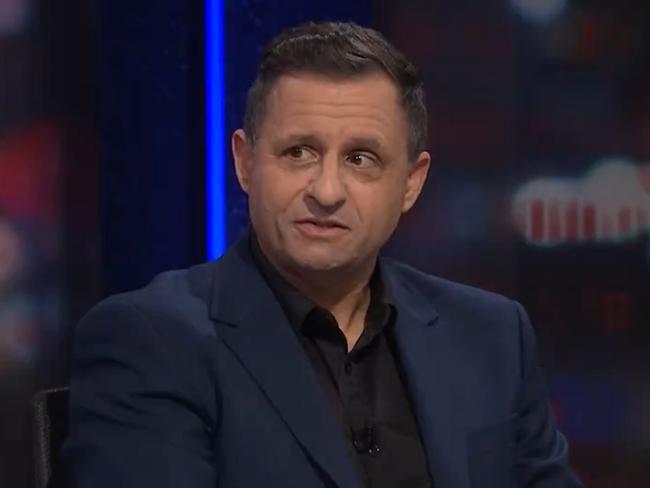
“They looking towards a future that guarantees them a lower quality of life and standard of living compared to previous generations. There is not much hope,” he said.
The government recently revamped tax cuts to reduce the benefit to wealthy Australians in order to deliver more to workers aged between 25 and 40 – but Mr Samaras believes they don’t go far enough.
He said that young Aussies have taken such a hit to their savings over the past few years that it will take “years to repair”.
“People are managing to pay their rent and mortgage but they are having to do that by eating into their savings and accruing credit card debt,” he said.
“It will take years, if not decades, for their saving to recover when interest rates finally drop enough.
“The situation is pretty grim.”
Rental stress is another major factor affecting young Aussies, with Mr Samaras claiming “very few people rent because they enjoy it”, adding that those who are renting in major cities like Sydney and Melbourne are doing so because they cannot afford a home.
He said they are handing over “significant sums of money” and it is forcing them to make “drastic decisions” about what they do and don’t buy.
“Discretionary spending is almost dead among this group,” he said.
Mr Albanese has claimed that the Federal Budget will deliver for all Australians, “not just some”.
“A tax cut for all 13.6 million Australians,” he said during Question Time on Tuesday afternoon.
“It will deliver stronger Medicare in every community, including an increased rollout of our Urgent Care clinics.
“It will deliver more homes in every part of the community. We now have $32 billion of support for housing in this country.”
Revamped tax cuts, which have been tweaked to deliver more to middle income earners, will see a worker on $100,000 get an extra $2179 a year.
The changes mean wealthy Aussies will be getting less than expected, with those earning $200,000 or more a year to get an annual tax cut of $4546 – down from a planned $9075.
Workers earning between $45,000 and $135,000 will secure an extra $804 a year compared to the original tax cuts.
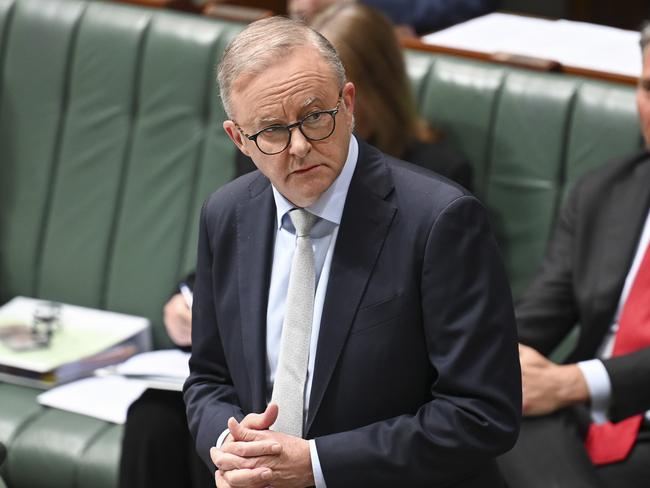
Prime Minister flags immigration changes
A record number of immigrants entered Australia in the year to September 2023 with a surge of 548,000 international students and temporary workers.
The influx has been blamed on exacerbating the housing crisis and Mr Albanese revealed Labor will cut immigration levels below 300,000.
“We want to bring it down to around about half of where it peaked. You’ll see a range of measures in tonight’s budget aimed at doing that, including a clamp down on integrity issues when it comes to higher education – that’s really important,” he told radio station 3AW.
More needs to be done for women, Aboriginal and Torres Strait Islander people
One advocacy organisation is calling for concrete steps to improve the lives of Aboriginal and Torres Strait Islander people, describing it as a necessity to reassure the nation that it cares.
“Everyone is hurting at the moment, communities across the nation are doing it tough, and what we need from this budget is some good news – a sign the Prime Minister is following through on the promises to invest in our communities. That was the promise he made to us,” The Coalition of Peaks acting Lead Convenor, Catherine Liddle, said.
“This year, on the anniversary of the Apology to the Stolen Generation, the Prime Minister stood up in parliament and said he would listen to and partner with us, but what Aboriginal and Torres Strait Islander people are seeing right now is business as usual.”
In February, a major Productivity Commission review found Federal, State and Territory Governments were failing in their commitments under the National Agreement on Closing the Gap and the Coalition of Peaks has called for more funding.
Meanwhile, a number of organisations want to see more done for parents. Thrive by Five, The Parenthood and SNAICC want to see a long overdue wage increase for Australia’s early childhood educators, which is likely to appear in the budget.
The groups also want to see abolished the “punitive” childcare subsidy Activity Test, which prevents over 126,000 children from accessing early learning and disproportionately impacts First Nations children.
The Parenthood CEO, Georgie Dent, said the Activity Test has been proven to negatively impact single mothers, low-income families and First Nations families.
“It was meant to incentivise work, but in reality, parents who don’t have a shift or a job cannot afford the out-of-pocket cost for early education and care because they don’t meet the requirements of the test,” she said.
National women’s organisation March4Justice has called for a national domestic violence database for all perpetrators that is to all prospective employers and potential new partners, among other things.
“This budget is an opportunity for the Australian government to show us what a woman’s life is worth,’ said March4Justice chair Janine Henry.
“For too long, the government has ignored the opportunity for long-term, systemic change by not investing in specialist services or centring the voices of survivors when it comes to reform.”
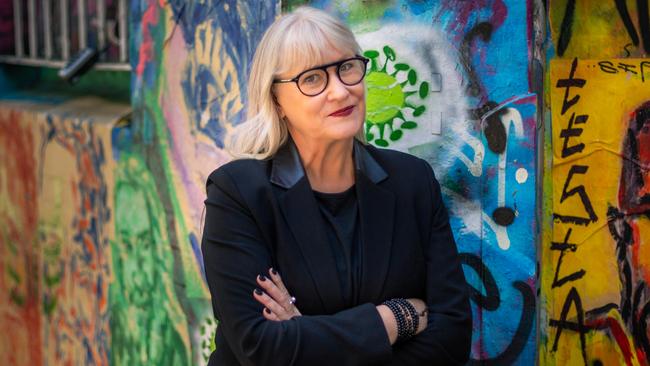
‘Grinding poverty’: Hefty criticism of budget already
Both the Greens and the Coalition have hit out at the budget and its surplus, but for very different reasons.
Greens economics spokesman Nick McKim has slammed the $9.3 billion surplus and has accused the government of not doing enough to actually look after the people impacted by inflation.
He accused the government of “prioritising their own political benefit”.
“So what you’re going to see in the budget tonight is that, having talked up an absolute storm on things like climate change and on things like cost of living, Labor is simply not prepared to take the action necessary to respond to those challenges that the urgency and the scale that is required,” he told ABC Radio.
Mr McKim said the budget is about “political choices” and Labor is choosing not to introduce policies that would make a difference.
He called for significant action on cost of living pressures such as “stopping the supermarket’s price gouging”, dental and mental health care via Medicare and seriously wiping out student dent.
“For example, you could end the massive tax breaks for property investors who own multiple investment properties then put in place a rent freeze and a rent cap, for example,” he explained.
“You could tax billionaires and CEOs on the basis of their wealth and you could use that revenue to raise income support, which would lift a large number of Australians out of the grinding poverty that they experience every day.”
The Antipoverty Centre has also said that a surplus without meaningful support for people in poverty would not make a responsible budget.
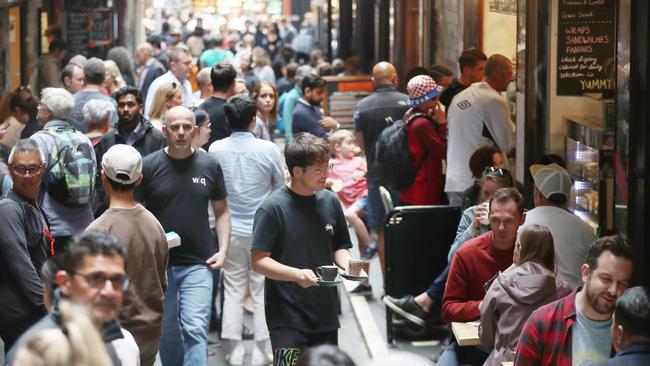
Fears over interest rate rises
The Treasurer told reporters in Canberra that the resilience of the labour market had driven the budget surplus but has hit back at suggestions the budget will stoke inflation.
“The budget will put downward pressure on inflation, not upward pressure on inflation,” he said.
“We’ll do that by showing spending restraint, by banking almost of all the upward revisions in revenue this year.
“And by making sure that we design our cost of living help so that it’s part of the solution to this problem. Our primary focus in this budget is cost of living and fighting inflation.”
When asked if rates will remain higher for longer, he said the budget is not the only influence and it was an independent decision for the Reserve Bank of Australia (RBA),
However, Treasury and the RBA are at odds on when inflation will return to its target rate.
Treasury anticipates a return to the RBA’s inflation band of 3 per cent by the end of the year and not 2025 as the Reserve Bank has predicted.
For the 2024-25 year, Treasury has forecast inflation to sit at 2.75 per cent – lower than the RBA’s forecast of 3.1 per cent.
Originally published as Federal Budget 2024: Every Aussie household to get $300 rebate




